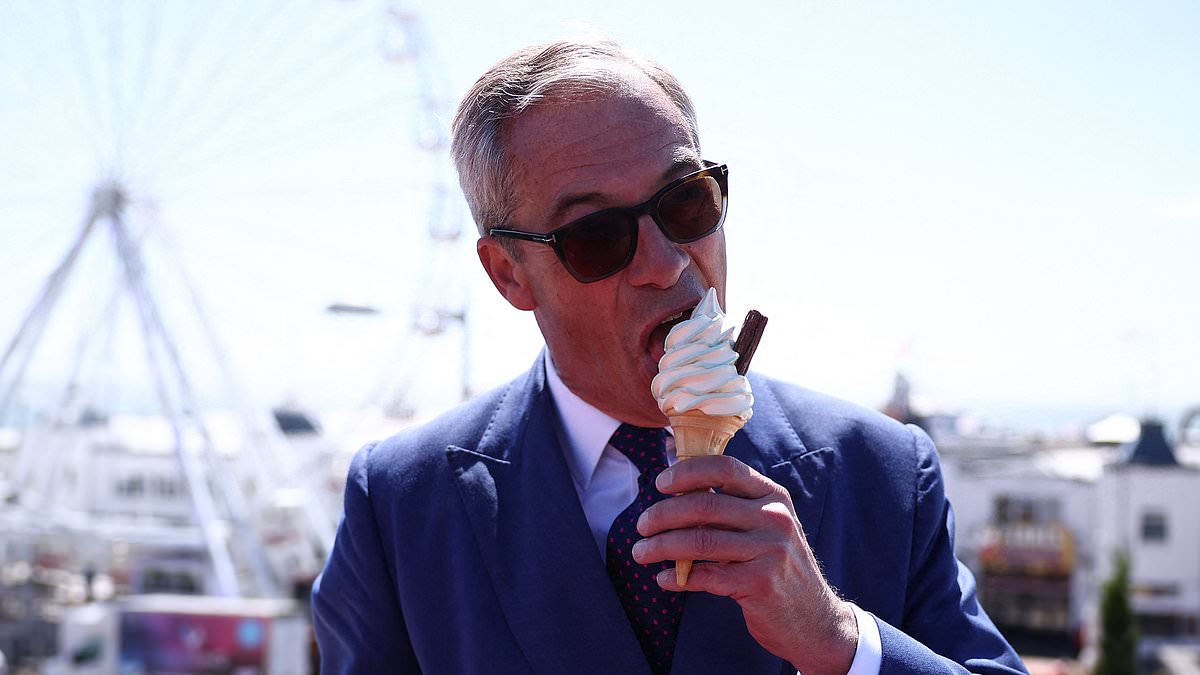Power already seemed to have begun ebbing from Rishi Sunak when he and his wife Akshata voted at Kirby Sigston village hall, North Yorkshire.
Hand-in-hand under a cloud-scudding morning sky, the Sunaks looked almost holidayish. He was still in that blue knitwear top while she was in a floaty floral dress and snazzy red shoes that seemed to scream ‘thank heavens we’ll soon be shot of Downing Street’.
Few photographers were in attendance. It was a little more than one bystander with a Kodak Instamatic, but the Press turnout was tellingly smaller than those Mr Sunak used to attract. By next month he’ll be able to streak down Northallerton high street and no one will turn an eyelash.
Two hundred and forty-three miles south, a different story: banks of snappers and TV crews, many from abroad, assembled in Kentish Town to see Sir Keir and Lady Starmer arrive to cast their ballots just before 10 am.
Security was heavy, members of the public being corralled into pens like sheep at the Three Counties Show.
The Starmers processed slowly – I almost said royally – and did some slightly constipated smiling while being followed at a short distance by a phalanx of bristling bodyguards. They were whisked away via a back door.
Behind the cordon sanitaire a new PM immediately vanishes, taken captive by the police outriders with their shrill whistles. Bomb-proof Range Rovers with smoked-glass windscreens. Sharpshooters with baseball caps. This level of security is probably unavoidable but it does nothing to keep our political leaders close to electors.
Reform’s Nigel Farage also had some armoured transport: a military-style Land Rover in which he toured Clacton-on-Sea waving his party’s flag. Mr Farage, unwilling recipient of airborne milkshakes during the campaign, had another encounter with dairy produce, this time more congenial.
For his elevenses he posed with a Mr Whippy ice cream cone. Nigel taking in some (semi) solids. Not something you see every day.
A necdotal evidence suggested business at polling stations was far from brisk. Would the turnout become part of the story? My London bedroom is opposite a polling station. I’ve known country churches attract more souls. Has the quasi-sacramental act of dropping your vote into a returning officer’s black box lost its appeal in this age of TV reality show voting by text message?
The Lib Dems’ leader Sir Ed Davey and his wife emerged from doing their civic duty at Surbiton Hill Methodist church in South-west London. Lady Davey held on to her husband, perhaps hoping to ensure he did not attempt another of his attention-seeking pratfalls. Churches, a boxing hall, a caravan, an office at the Henley Royal Regatta: polling stations came in all shapes.
Some candidates took a son (in the case of Sir Jacob Rees-Mogg, two sons) to the polling station. Scots Nat leader John Swinney was accompanied by his 13-year-old boy Matthew. Scottish Labour leader Anas Sarwar posed with his little lad Aliyan. Young Alfred and Sixtus Rees-Mogg formed the security detail for their father Sir Jacob.
It was a hot day in West Harptree, Somerset, but Sir Jacob was in a double-breasted grey suit.
When Mr Sarwar arrived to vote in south Glasgow he was trailed by someone holding a banner that said ‘Starmer Is A Snake’.
A protester dressed as a bear was also awaiting Sir Keir in Kentish Town.
He or she – or maybe it – was holding a poster calling for fake fur to be used for military bearskin caps.–
Two community-support coppers loitered either side of the bear, either in case it turned feral or in case it fainted from heat exhaustion in the warm July sunshine.
As for the Sunaks, their route home took them near Sigston Castle, which in the 14th century was a mighty edifice but is now little more than a grassed-over bump on the landscape. Earth’s proud empires pass away until all that’s left is a ditch and a lump of soil. That’s politics for you.
